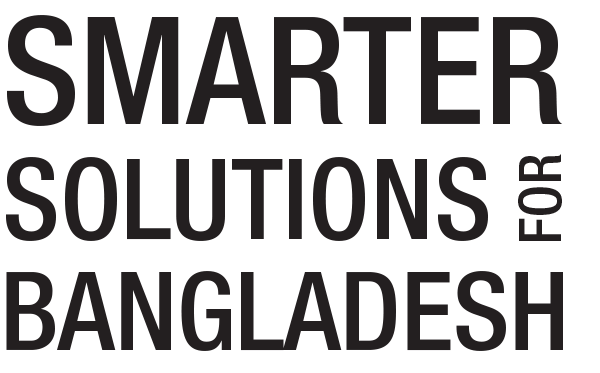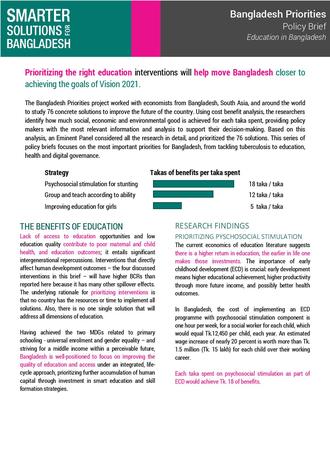Smart Policies for Bangladesh
The Bangladesh Priorities project worked with economists from Bangladesh, South Asia, and around the world to study 76 concrete solutions to improve the future of the country. Using cost-benefit analysis, the researchers identify how much social, economic and environmental good is achieved for each taka spent, providing policy makers with the most relevant information and analysis to support their decision-making. Based on this analysis, an Eminent Panel considered all the research in detail and prioritized the 76 solutions. This series of policy briefs focuses on the most important priorities for Bangladesh, from tackling tuberculosis to education, health and digital governance.
Policy Brief on Education in Bangladesh
Lack of access to education opportunities and low education quality contribute to poor maternal and child health, and education outcomes; it entails significant intergenerational repercussions. Interventions that directly affect human development outcomes – the four discussed interventions in this brief – will have higher BCRs than reported here because it has many other spillover effects.
Policy Brief on Tuberculosis In Bangladesh
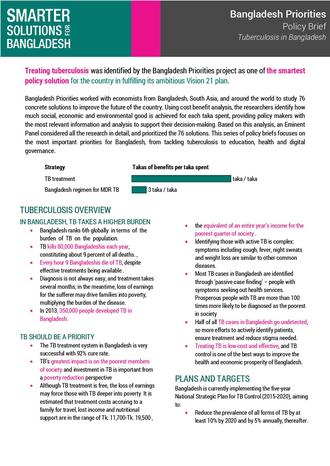 Treatment of TB is low cost and effective in Bangladesh, giving each TB patient, on average, another 25 years of life, as well as reducing contagion and preventing at least one more person from getting TB. The key to expanding TB control in Bangladesh is to identify more persons who need testing for TB and link them to effective TB treatment services. The brief reviews two policy interventions for expanding TB control specifically in the Bangladesh context, examining their contribution to the Bangladesh strategy for tackling TB.
Treatment of TB is low cost and effective in Bangladesh, giving each TB patient, on average, another 25 years of life, as well as reducing contagion and preventing at least one more person from getting TB. The key to expanding TB control in Bangladesh is to identify more persons who need testing for TB and link them to effective TB treatment services. The brief reviews two policy interventions for expanding TB control specifically in the Bangladesh context, examining their contribution to the Bangladesh strategy for tackling TB.
Policy Brief on Union Digital Centers in Bangladesh
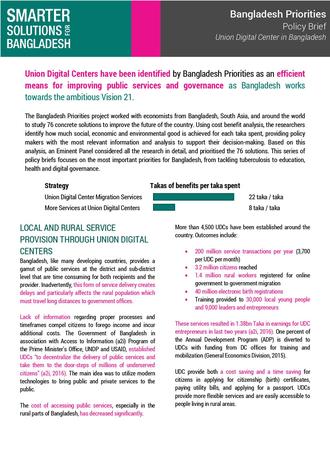 Bangladesh, like many developing countries, provides a gamut of public services at the district and sub-district level that are time consuming for both recipients and the provider. Inadvertently, this form of service delivery creates delays and particularly affects the rural population which must travel long distances to government offices. This brief explores two strategies with high returns which could overcome these challenges.
Bangladesh, like many developing countries, provides a gamut of public services at the district and sub-district level that are time consuming for both recipients and the provider. Inadvertently, this form of service delivery creates delays and particularly affects the rural population which must travel long distances to government offices. This brief explores two strategies with high returns which could overcome these challenges.
Policy Brief on Fiscal Management Reform in Bangladesh
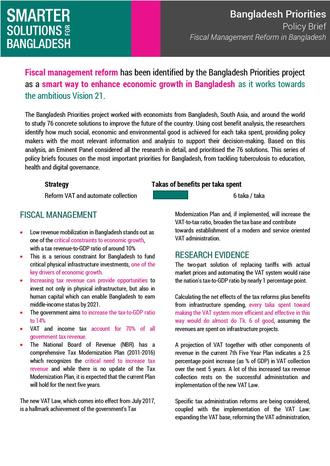 The government, for the upcoming Budget FY2017-18, has prioritized some key activities related to the new VAT law and its implementation, many of which were also recommended by Bangladesh Priorities and discussed in this brief.
The government, for the upcoming Budget FY2017-18, has prioritized some key activities related to the new VAT law and its implementation, many of which were also recommended by Bangladesh Priorities and discussed in this brief.
Policy Brief On Maternal and Infant Health in Bangladesh
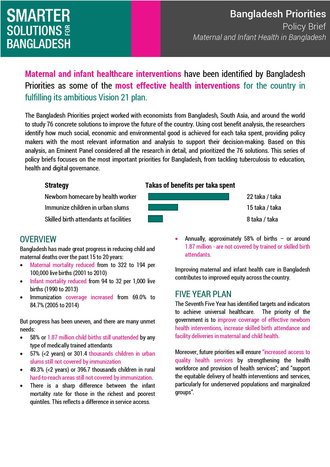 Bangladesh has made great progress in reducing child and maternal deaths over the past 15 to 20 years, but progress has been uneven, and there are many unmet needs. Bangladesh Priorities investigated a range of health-related interventions, and found three discussed in this policy brief that would result in the highest benefits for every taka spent.
Bangladesh has made great progress in reducing child and maternal deaths over the past 15 to 20 years, but progress has been uneven, and there are many unmet needs. Bangladesh Priorities investigated a range of health-related interventions, and found three discussed in this policy brief that would result in the highest benefits for every taka spent.

